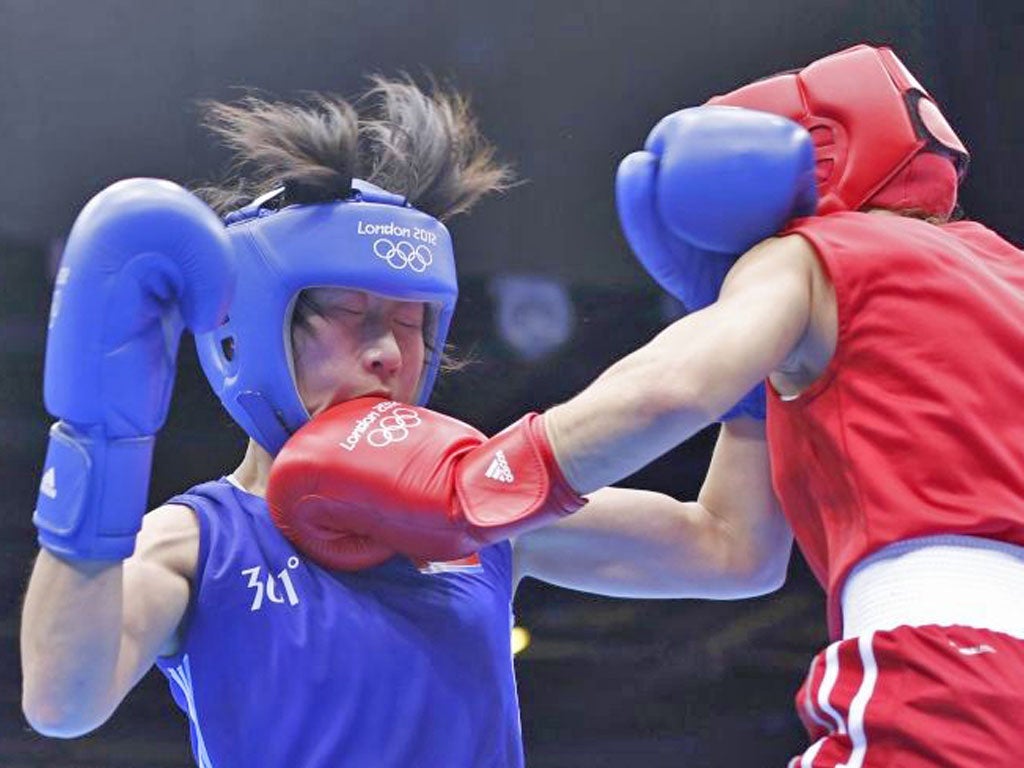Men are better at making up after a fight than women, study suggests
Male boxers sustained 'peaceful post-conflict affiliation' after a bout for more than twice as long as women

Men spend more time making up with a sporting opponent than women, according to a new study which suggests males evolved to be better at dealing with conflict than females.
Academics from Harvard University and Emmanuel College in the US looked into how boxers and tennis, table tennis or badminton players reacted at the end of a match.
They found that men spend significantly longer touching their opponent than women – particularly after boxing when they would maintain contact for more than twice as long.
“The results provide support for the conclusion that human males tend to be more concerned than females with expressing affiliative behaviours following conflicts with unrelated same-sex peers,” the researchers wrote in the journal Current Biology.
“This may help to account for greater male cooperation in many types of non-kin-based organizations, such as government, business, and religious institutions.”
They said this pattern appeared to develop in middle childhood “when boys tend to engage in larger and more interconnected groups than girls”.
Their findings support the “male-warrior hypothesis”, which argues that success in conflicts between different groups has been “vital” in human evolution, essentially forcing men to cooperate with others they have fallen out with.
“The evidence that human males spend more time than females in post-conflict affiliation with same-sex peers suggests that cooperation among males within a society, even without a close social relationship, has been a characteristic feature of human evolution,” the paper added.
However other researchers have concluded that women are better at cooperating than men, who focus more on competition. A 2007 study found women cooperated more effectively when playing a game called the Prisoner's Dilemma.
One of the researchers, Professor Joyce Benenson, said the need for males to cooperate could stretch back to before modern humans evolved.
“We believe that human social structure resembles that of chimpanzees in which males cooperate in groups of unrelated same-sex peers and females cooperate more with family members and one or two good friends who act as family,” she said.
“Human males form large cooperative organizations that have changed the world.
“Females traditionally invest more in families to keep their children and other family members alive and thriving.
“We expect that this is an evolved sex difference in social structure that still operates today.”
However Jemima Olchawski, head of policy and insight at UK gender equality campaign group the Fawcett Society, dismissed the broader claims made by Professor Benenson.
"It's absurd to claim that men are better at cooperating in the workplace than women," she said.
"It's these kind of flimsy generalisations that hold both women and men back at work and help to maintain a gender pay gap of nearly 14 per cent."
The study found that women tended to sustain “peaceful post-conflict affiliation” with their opponent for an average of 2.8 seconds after boxing, 0.8 seconds for tennis, 0.8 seconds for badminton and just 0.25 seconds for table tennis.
The men spent about 125 per cent longer doing this after boxing and table tennis matches and 50 to 60 per cent longer after a badminton or tennis match.
While the difference in the actual times between the sexes was only slight, the researchers said it was significant.
“The total duration of affiliative contact was always only a few seconds … but short durations and small absolute differences nevertheless are expected to convey critically different information," they wrote in the paper.
“For example, quickly brushing fingers, fully clasping hands, adding a soft clap of the back, and embracing are ordered in terms of increasing duration and communicate increasing intensity of positive affect but differ by less than one to two seconds in duration.”
Male winners were also 42 per cent more likely to touch the loser’s body with an arm than women and male losers were 22 per cent more likely to do the same than female ones.
“There was no sex difference in two-armed embraces or kisses,” the paper added.
However the researchers said there could be other reasons behind their findings.
“Women may be less invested than men in sports for reasons such as reduced interest, lesser financial compensation, or lower prestige, which could weaken their incentive to repair a conflict and participate in the future,” they wrote in the paper.
They said the women may have tried to reconcile later in private, but added this was probably “unlikely”.
And they added: “An alternative interpretation of our results is that women intuitively feel more strongly bonded to same-sex individuals than men do, thereby obviating the need for reconciliation following a conflict."
The male warrior hypothesis has also been used to suggest why men are "more likely to support a war" and also "more likely to lead in autocratic, militaristic ways than women".
Commenting on the study, Professor Robert Deaner, of Grand Valley State University, who was not involved in it, told BBC News: “That men are more likely to reconcile after a conflict supports other studies showing that male-male relationships are generally different than female-female relationships.
“A woman's relationship with another woman is often gravely damaged if one woman achieves greater status than the other or somehow outdoes her.
“Men, by contrast, seem to better tolerate these kinds of ups and downs, which may be why men seem better than women at maintaining large same-sex social networks.”
Join our commenting forum
Join thought-provoking conversations, follow other Independent readers and see their replies
Comments